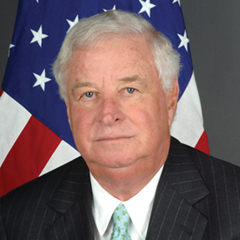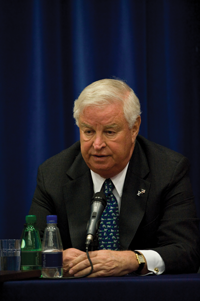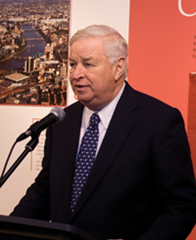America in the world: Louis Susman interview
 In his only print interview during his latest visit to Northern Ireland, US Ambassador Louis Susman discusses America’s position in a changing world with Meadhbh Monahan and emphasises its commitment to Northern Ireland.
In his only print interview during his latest visit to Northern Ireland, US Ambassador Louis Susman discusses America’s position in a changing world with Meadhbh Monahan and emphasises its commitment to Northern Ireland.
“There’s a great emotional attachment as well as the investment aspect,” the United States Ambassador to the UK Louis Susman says of the link between America and Northern Ireland.
His message to the province is “one of encouragement.” America has “invested a lot in Northern Ireland” and “its success, which is moving in the right direction, is important to us,” he tells agendaNi.
Pointing to the Assembly and US-Northern Ireland university links (such as the research scholarship between Queen’s and Georgetown University), the Ambassador comments: “Northern Ireland today has a really bright future and America wants to be a part of that future as a partner.”
While Hillary Clinton has been a stalwart for keeping Northern Ireland on America’s foreign policy agenda, her term as Secretary of State is expected to end in January 2013. When asked how Northern Ireland should engage with America given the region’s declining profile, Susman points out that both Bill and Hillary Clinton’s interest in the region is “still very intense”, as is that of the Obama Administration.
The business climate is positive for American investors. “I had dinner with four managing directors of American companies that have large operations here and they say business is great, they are happy to be here.” Susman says.
BBC journalist James Naughtie has told agendaNi that “many Americans are profoundly sceptical of the idea with which they grew up, that it was almost an inheritance of theirs that every generation would be better off than the one before.” Asked if the American Dream has ended, Susman responds: “First of all, I believe in the American Dream because I am living it as the Ambassador to the Court of St James.” He adds that Obama is the prime example.
The 73-year-old former investment banker does admit that “there is a lot of economic anxiety in the world today.” That anxiety and “the changing world we are in” is affecting young people in particular. The Ambassador notes: “I think they are feeling not totally uneasy about their future but I feel the difference is: If their parents have a home and a second home, will they have a home and a second home? Will they get a job that will [give them the best opportunity]?”
This is not unique to the United States. “That’s an anxiety that I’ve sensed in England, that’s an anxiety that I’ve sensed here in Northern Ireland and when I travel around the world. It’s the just the very nature of all these geo-political events that are causing people to have concerns.”
He is heartened by “the ingenuity and creativity of young people to get jobs” e.g. in the Peace Corps or in Teach For America where they are “giving back to their communities.” Overall, Susman believes: “The American Dream may not be as bright as it was 50 years ago [but] I don’t think the American Dream is dead.”
America’s federal deficit reached its $14.3 trillion ceiling in May 2011 which was then raised to $16.4 trillion in January 2012 amid fears that the Administration would default for the first time since 1979. China held $1.13 trillion (24 per cent) of foreign-held US Treasury securities in November 2011. Some policy-makers fear that China will sell a large share of its US holdings, prompting similar action by other foreign investors thereby destabilising the economy. Others argue that China could use its large holding as a bargaining chip.
“I don’t think it will surprise you that I think America’s place in the world is immense,” Susman states. “We have the largest GDP, our defence budget is larger than the next 10 countries [combined]. China is $59 billion, we are $660 billion.”
Recognising China as “a very rising power”, Susman adds: “It will continue to rise but it does have its issues, whether it’s inflation or civil unrest or that its growth rate has slowed substantially from double-digit to eight per cent. We’ll be able to compete with it and we’ll compete at all levels.”
However, there are discrepancies with the defence budget ranking, which were first cited by President Obama on 5 January at a Defence Strategic Review in the Pentagon.
An Administration source has since clarified that if war spending were included, the US military budget would be larger than the next 12 countries combined, whereas if only the base budget is counted, the budget is larger than those of the next eight countries. He said the President was making a “rhetorical point”. In addition, a 2010 report to Congress on military and security developments in China estimated its 2009 military expenditure at
$150 billion.
Susman is passionate about America’s continued dominance across the globe, claiming: “Everybody I know in every country is always anxious to interact with America.” However, he recognises that “we can’t go it alone anymore”. Ultimately, the United States’ policy is partnership, he explains.
“America in President Obama’s administration is not looking to be a bullying power or a superpower; we are looking to use smart power.” He continues: “Whether it’s in Asia-Pacific, in Europe, or South America, we are trying to create partnerships, but that being said, we still want to be an appropriate leader.”
In the context of the Arab Spring, agendaNi asks Susman about America’s priorities in a changing Middle East.
“Our objectives there are to help countries have the right to self-determination, to have values that are similar to ours [such as] right of assembly, women and minority groups’ rights are protected, religious freedom, and for them to have the ability to choose their own government,” he responds. “That being said, we would like it to be a democratic government,” the Ambassador contends. If countries chose another type of government, “that’s their prerogative.”
President Obama’s quote is particularly relevant, Susman says (i.e. “The Arab Spring is inspiring but unsettling because we are not quite sure what’s going to come next.”) America “can be very helpful in providing economic aid to those countries that will be willing to forsake corruption and get it to their people to improve their way of life.”
Looking to Egypt, the Ambassador denies that there is a contradiction between America welcoming its moves to democracy while having been a strategic ally to the Mubarak dictatorship for 30 years.
“The fact is that everybody has to deal with the hand that’s been dealt them,” he states.
“[Hosni] Mubarak in many ways provided leadership in the Egyptian-Israeli conflict. He was helpful in terrorism, dealing with Hamas on the West Bank, and yet he was a dictator and there was corruption and there were abuses of human rights. We tried to work a strategic relationship with him but we never gave up trying to encourage him to not have abuses.”
America sees Egypt as “the key lynchpin” to making the Arab Spring work. “You got 70 million people there. You get Egypt right, you will get a lot of things right,” Susman states.
He adds that America “would have preferred not to have certain autocrats and dictators in countries we had to deal with” but repeats: “You have to deal with the hand you get but you never give up your values.”
On Afghanistan, Susman is hopeful. “In 2011, we made great progress. al-Qaida has been substantially dismantled, there are very few al-Qaida [personnel] left in Afghanistan,” he reports. The Ambassador claimed that the ability for Afghanistan to “stand on its own feet” is getting stronger every day, pointing to increasing numbers joining the army and “integration and reconciliation with the Taliban.”
However, he recognises that the situation is “still fragile” and says America will remain “committed” long after leaving in 2014. Since the interview, US Defence Secretary Leon Panetta has announced a planned withdrawal by mid to late 2013, rather than 2014, and to “make a transition from a combat role to a training, advise and assist role.”
Special relationship
“When America has an issue, the first call we pick up is to the United Kingdom as our ally,” Susman remarks. The UK-US special relationship is, as Obama said, “not only special but it’s essential.”
Despite reports that the relationship may have been affected by Wikileaks revelations and Britain’s suggested early withdrawl from Afghanistan, the Ambassador insists that “the relationship couldn’t be any closer.” He continues: “Just because of the fact that we have to deal with the rise of the Asia-Pacific countries, doesn’t mean that we are abandoning Europe or that we are minimising our relationship.”
He points to a forthcoming official visit to be taken to Washington by David and Samantha Cameron on 13 and 14 March. “I’ve been the Ambassador for two-and-a-half years and I couldn’t imagine a closer relationship with practically no foreign policy disagreements or objectives.”
On Wikileaks
Following the Wikileaks revelations, David Cameron said the fundamentals of the UK-US special relationship were still intact.
Susman lists these fundamentals as: common values, the rule of law, a common heritage, and that “we speak the same language – sometimes.” He laughs: “We are two countries separated by a common language.”
Americans are looking forward to the 2012 Olympics in London and held parties at 3am to celebrate the royal wedding. He tells agendaNi: “I think everything in terms of the United Kingdom and America is in pretty good shape.”
Asked what impact Wikileaks revelations had on US diplomacy, he says: “It had zero impact on US diplomacy.” Diplomats “were doing what they were supposed to do, which is to report to their capitals what’s going on in the host country and doing it in a way that is candid and honest.”
Profile
Ambassador to London since July 2009, Chicago-born Susman was a senior partner at the St Louis based law firm of Thompson & Mitchell for 27 years. He then joined Salomon Brothers (later Citigroup), where he was Vice Chairman of Citigroup Corporate and Investment Banking.
In 1998 he was appointed by President Ronald Reagan to the US Advisory Commission on Public Diplomacy, which provided oversight to the US Information Agency. He is credited with spotting Obama’s potential at a gala fundraiser while he was the national finance director on John Kerry’s 2004 presidential bid. He later became a financial backer to Obama’s presidential campaign.
Married to Marjorie, they have two children and three grandchildren.







